—
|
Punch the clock
Pat Carty
The bright, shiny, and brilliant The Boy Named If is the latest chapter in the on-going Elvis Costello show, and 2022's first must-own album. "I'm always anxious to do anything that's a new adventure, because you come out of it knowing something you didn't know when you went in," he tells Pat Carty.
|
The 15-minute interview, as the great Pete Paphides recently pointed out, is a tricky customer. For every one where 15 minutes is about 10 minutes too long, there are many where an hour, or two, doesn't even scratch the surface. Having spent decades listening to his music — I could point at eight albums, at least, that are unquestionable classics — as well as closely reading his interviews, sleeve notes, and that marvellous autobiography, Unfaithful Music & Disappearing Ink, I've always suspected that Elvis Costello would fall into the latter category. Having said that, will we take the 15 minutes on offer? Of course we will.
Costello is on the Zoom circuit to push his new album with The Imposters, The Boy Named If, which is a very good, loud, clanging rock 'n' roll record, and not a million miles away from some of those classics recorded with his first backing band and alluded to above. Indeed, in the circulated press materials, Costello has this to say: "This year, This Year's Model came back to surprise us in another tongue. That edition is called Spanish Model. Both that album and The Boy Named If are records that are happening right now and if you want to draw a line between them, go right ahead."
Spanish Model, as he'll sort of explain himself, was a 2021 release where Costello's voice was removed from the master tapes of that first Attractions record and replaced with various Latin singers. So, as he indicated it was ok to do so, I'll open by drawing that line. I have a thousand questions but, in my haste to maximise the allotted time, I make a balls of the first one.
"What record did you say?' asks Costello, eyebrow raised above the rim of his dark glasses.
Spanish Angel. The re-jig of My Aim Is True. I mean, This Year's Model.
"Spanish Model?"
Spanish Model! I do apologise.
"'Spanish Angel' is the song I'll write next week." I hold up a copy of This Year's Model in my defence and point out it was purchased with my own money, which earns a laugh. I persevere. Did going back to those tapes reignite something for him? After all that palaver, Costello isn't having it anyway.
"No," he states, categorically. "Bear in mind I had recorded in Helsinki, in those carefree days when you could just get on a plane and go anywhere, and made some sort of noisy, clattery kind of music on my own, just for the hell of it. There's a lot of guitar on 'No Flag' [on 2020's Hey Clockface and inspired, at least in part, by The Stooges, according to the man himself], so you could draw a line from that to this record, but I don't really think this record sounds like those recordings."
Maybe not, but it's at least in the same clattery ballpark. Elvis fills in some more detail behind the Spanish Model project.
"We opened up the tapes again, the multi tracks, because we had to remix 'This Year's Girl' for David Simon's series The Deuce, and we heard how good everything still sounded. And when we took my voice out to put another singer in, as they had requested, I just had this notion to do this with every song on the record, in Spanish, and I knew Sebastian [Krys, multi-Grammy winning producer who has been working with Costello since 2018's Look Now] knew which singers would have fun doing it. It was tremendous to hear the songs sung again in a very different way in another language, but I don't like to say, 'Well, I've done that so now I have to do something different'. It's just what I'm doing. It's always been that way. I never really made a master plan."
|
I Can't Stand Up For Falling Down
|
I start into my next question by saying that Costello has described Look Here as uptown pop. I've done it again, and he's on to me.
"It's Look Now! Look Here is a bit more threatening. I think that's a better title. You could have an advert for it, 'Look Here! Here's these songs, you better fucking listen to them!"
Well, if that was an uptown pop record...
"Pat, I'm gonna call you up before I put every record out in the future and check that the title is really the one it should be, because you're coming up with better titles. Look Here and Spanish Angel. That's the remix album 40 years from now. Spanish Angel is going to be the Serbo-Croat remix of This Year's Model."
When you record an album of Mink DeVille songs, call it Spanish Angel, I offer. I think he's laughing with me, rather than at me. I think so. An uptown pop record like Look Now — a criminally underrated album — calls for some heavy duty arranging. Is a record like this one easier to do? This query sends him off again and it is at this point that I quietly crumble up my sheet of carefully prepared questions and throw it in the bin, feeling it best to just let him at it.
"They're all arrangements, but with Look Now, you had to give a bit more thought to where you didn't play, because if I had Steve [Nieve, Attractions and Imposters keyboard genius] just going out on every track, then it would obviously collide with where I'd written the orchestration. That record is the kind of music I really love, and it's the kind of music that's on Imperial Bedroom [1982 if-it-ain't-baroque-don't-fix-it masterpiece] and on Painted From Memory [1998's awe-inspiring collaboration with Burt Bacharach, more on which later]. Look Now was the first record The Imposters had made without being on location. We weren't in Mississippi, we weren't working with Allen Toussaint in New Orleans [2006's. The River In Reverse, you should buy that one too], we were doing something that was just us, some songs I'd had for a while, and some brand new songs.
"Hey Clockface was a mixture as well, because I didn't know where that recording was going to end. And of course, circumstances that we've all lived through affected the way that record was concluded. There were going to be more sessions but I came home and listened to, and liked, what I'd done — I'd cut 12 songs in five days — and two more pieces completed that puzzle."
This brings Costello up to the genesis of The Boy Named If.
"After a couple of months of being home," he continues with very little, if any, pause, "we started to realise we weren't going back on the stage anytime soon. Pete [Thomas, the man Costello recently said has been promoted to the position of best drummer in the world now that Charlie Watts is no longer with us] likes to be ready to play so he puts the hours in every day. What does he do? He goes down in his basement. What does he have in his basement?"
"That's his practice kit, this Gretsch that he's always kept. A drum-kit in a little room is kind of the sound that I started with, 'Watching The Detectives' is the sound of a drum-kit bouncing off of a wall that's really close. He was playing along with all his favourite records but he was getting bored, he wanted to do something. I sent him one of these tunes, just me hammering it down on one guitar, and he sent
it back to me with the drums in place. Then I sent it to Davey [Faragher, Imposters bass-playing hero who's also togged out for Richard Thompson and John Hiatt]."
 "I don't really think it's influenced by anything from the past," he says, returning to my first question. "The uninhibited way we're playing, and the trust that we have in each other, is why it came out sounding energetic and vivid. The songs are about different times in life; you're leaving all the wonder and magical things of childhood, and getting into lust and algebra when you're a teenager, then you're in your early twenties and you don't know what's right and wrong, but everything's exciting.
"Then you look back a little bit later at things you did, maybe you can take responsibility for them, maybe you can't. It's not like my diary, it's not my last confession, but they've made pretty vivid songs, to my ear. A lot of the music I heard in the early months of people not being out there playing sounded a little bit defeated, in a defensive crouch, that wasn't what I wanted from the music. I wanted the music to feel alive."
|
Everyday I Write The Book
|
The Boy Named If certainly achieves that and it's housed in a rather fetching package, bedecked with illustrations from the hand of one Eamonn Singer, a Costello alias responsible for the cover art of Blood & Chocolate and Look Now, amongst others.
"I have to say it was quite a personal reason why I took to scribbling more avidly in recent times," Costello explains. "My mother got very ill, she had a stroke. I was waiting by her bedside for about five weeks. When you're in a hospital ward and somebody's screaming, somebody's sleeping, somebody's crying, and somebody's complaining, you can't take a guitar in there. I wanted to do something to keep myself from worry. And something I could do very quietly, without imposing myself on anybody else, was to just sit there with this electric pencil and scribble away. Gradually, the pictures got more and more ridiculous, macabre and humorous in some cases. They weren't anything to do with her circumstances, I was thinking about work I was doing."
This reminiscence sparks a flash of anger. I can't tell whether it's directed at me or not.
"When people stridently don't like something, but they don't know where it comes from, that just makes me do it more. That's been my way with music, if people don't like things I do, I'll just do them to 100 percent. That's just my nature. Don't pick a fight with me about what I'm thinking, because you don't know what's inside my head. You're not a fucking priest or the Holy Ghost, you don't know my motivation, you don't know what's in my soul. If you want a song to sound different, fucking write it yourself. You can even pick up your own fucking pencil if you don't like this drawing... Fuck off."
I'm not sure what happened there but Costello seems genuinely upset. I change the subject. Also included within the album/book are short vignettes or "fables," expanding on each lyric. To pick one at random, the writing around "The Difference" made me think that the song's stabbing takes place on a stage rather than in "real life." Costello explains their inclusion in the first place.
"You picked an unusual one as an example. First of all, the reason they exist is because I wanted there to be a physical object that people could hold in their hands. We all, I'm sure, like the accessibility of being able to call up a number on your computer, and hear it right away. The downside is any suggestion of a programme in which you're supposed to initially consider music is very fractured by that delivery. It's like you toss the songs into the stream, and then they just float away, like a bunch of sticks.
"Having arrived at the idea that the songs were a collection of stories, children's stories or people acting like children, and having gone so far as to draw the cover, with a story within a picture, I thought, why don't we
just make a book. Very quickly, I wrote these short stories. What happened immediately before the song started playing? What happens immediately after? What's happened in the background when this is happening in the foreground and vice versa?
 "You don't have to see the story book to enjoy the songs, you also don't have to know that 'The Difference' is based on a line from Pawel Pawlikowski's film Cold War but it is, as was 'I Do' on Clockface. We had a discussion about the possibility of adapting that film for the stage. 'The Difference' comes from a specific line in the film, you'll find it if you watch it again. Sometimes a line in Shakespeare or a line in the Bible can inspire a song. 'Watching the Detectives' doesn't specifically refer to a film noir, but it's obviously about somebody becoming very absorbed with detective film or detective show, whatever you imagine it to be.
"I've always taken cues in songs from unusual sources, sometimes they're experience, sometimes they're observation. I can think of maybe five songs on Brutal Youth that have either titles, images, or whole narratives that come from paintings. I didn't say that at the time because people would have thought I was out of my mind. That wouldn't have lined up with, 'Oh, he's back with the old band and aren't they rocking?' That was easier to say than actually listen to what songs are about.
|
For The Stars
|
Brutal Youth is one of my favourite Costello records, partly because it rocks, but I take his point. Elvis is still talking so I'm not going to stop him. Sticking with songwriting I point at the scene in The Beatles: Get Back where McCartney — who Costello is no stranger to — pulls "Get Back" out of the air and ask if it ever works like that for him.
"It can do, it can do," he considers. "I know that you can will a song into existence. I found it comforting that even The Beatles have to just sing nonsense words sometimes until the real words emerge. You've got the rhythm, you've got the cadence, the melody, you've got everything but the sense, and sometimes that's the last thing to appear. Sometimes it's the first thing and you could propose two or three different tunes to carry that idea.
"There is no hard and fast rule. If I knew how to do it, I'd do it all day long, and I'd be writing songs for Adele. Some people talk about it as a muse thing, sometimes it feels trance-like, and sometimes it's just work. Because these songs were written close together, there was obviously some connection. But I didn't sit down and say I'm going to write a concept record like a Yes album. It wasn't that kind of thinking at all."
Thank God for that, says I, and Elvis nods in agreement. There's a reissue of that Painted From Memory collaboration with Burt Bacharach mentioned earlier due this year. Costello seemed only too happy to expound on it at length. The clock had now gone out the window so I just sat back and enjoyed listening to the man talk.
"Burt's effect on me as a listener goes right back to Perry Como singing 'Magic Moments' on television in the '50s," he reflects. "I can remember that very vividly. I really have a very strong memory of hearing Cilla sing 'Anyone Who Had A Heart' and not knowing why it made me feel peculiar. The music's really odd. You probably know it's written in different time signatures, and for a slow song, it has this weird effect on you, because it breaks out of metre.
"As I got older, I could appreciate that sort of carnal or sensual implication of so many of Burt's songs. There are songs I could point at, before Burt and I ever met, where I was attempting to speak in that kind of language, with differing degrees of success. Maybe it's better that I couldn't get closer to the model and I just came up with my own song like 'Accidents Will Happen.' I remember thinking, 'That's sort of like Burt.' It doesn't sound remotely like him, but in my mind, it was indebted to him in some way.
"From the time we've written together, we wrote an album, it was reinterpreted by Bill Frisell [The Sweetest Punch, which also features the great Cassandra Wilson], a bunch of people recorded 'God Give Me Strength' [commissioned for the 1996 movie Grace Of My Heart, and one of Costello's greatest achievements], and we were approached to write a musical based on it, but it never really cohered.
"Those were some of the songs that Burt led The Imposters in the studio on Look Now, that was an amazing session — 'Don't Look Now' and 'Photographs Can Lie' — and there were other songs that we'd written together which The Imposters and I recorded with Steve Nieve playing, like 'He's Given Me Things.'
"There's still more, we were asked to write a score for Austin Powers and he wrote some fucking beautiful tunes. I wrote all of the music in 'Stripping Paper' on Look Now for that Painted From Memory musical. I gave that song to Burt, and he said, 'That's finished, I'm not gonna add anything.' That's a pretty big compliment."
"The best thing of all was in Capitol Studios, maybe two months ago, with Burt and a 30-piece orchestra," he continues with a grin. "It's like the dream, you're in the studio, like Cilla doing 'Alfie,' you're in the booth with a little chair that Sinatra used to lean on! Capitol is really a place to go to. When you walk down the hallway, it's like, get ready, because it's [pointing at imaginary pictures on an imaginary wall] Nat Cole, Peggy Lee, Sinatra, Gene Vincent, it's intimidating. I suppose people feel the same way about Abbey Road and probably feel the same about Windmill Lane, there's history in there and that's something that can spook you out or lift you towards doing a good job. It was really something."
Even someone of Elvis' stature has got to be pinching himself in that situation.
"Burt was standing up at the board, looking at the score and I knew what was coming," he recalls. "The voice comes on the talk back [breathless Burt burr], 'Elvis, you're not singing the right melody at bar 12.' I just got one note wrong in the melody and he's heard it and then he's like, 'We gotta really pay attention to downbeat at 61.' Nothing escapes his notice, every single time I've been on stage with him, he's the same. It's not like he's unreasonably demanding, he's just got incredible focus.
"Listen to those records he orchestrated and partly produced at Scepter, how incredibly focused every part is in the orchestra and in the rhythm section, everything is serving the story. It's at a level that really probably very few groups other than The Beatles, in a very different kind of form, have. It's never less than it needs to be. People are making Lego now by comparison. Two bar phrases, end on end, 12 people to write a song — great if you like it, but Burt can write the whole thing, and the orchestration. The only thing he doesn't do is write words, that's my job."
|
Beyond Belief
|
Even at this stage, Costello's still learning from people like Bacharach.
"Christ yeah. I left school at 17, and I've worked at trying to be a musician ever since," he says. "I don't have any formal musical education. I took some music lessons from Michael McGlynn [Irish composer and founder of Anúna, who worked with Costello and The Chieftains on "Long Journey Home"] when I was 40, to break this bloody mental block I had about musical notation. Once I was away, I was able to write and imagine things, I could communicate with people that I really wanted to work with, like The Brodsky Quartet.
"Little details in the music were escaping, because I didn't know how to write them down accurately, so it was very necessary. For some people it's, 'Oh, you're trying to make yourself look smart doing that!' That's only because they have an orthodox view about music that begins and ends with rock. I don't even like square rock, gimme rock 'n' roll. After a certain point, I dial it out and I'm listening to The Temptations. I want syncopation. Your imagination goes, 'I want more complex harmony.' It doesn't mean I have to only write that because I love three-chord songs, but if it's only going to be this narrow church, that's not what I do.
"Whether you can command it all, or have it serve you is another matter, but at least be aware of it and don't talk down to it, because there's beautiful things happening just out of your view. And that's why I would always be anxious to do anything that's a new adventure, because you come out of it knowing something you didn't know when you went in. Burt is a perfect example, there was a lot to learn from observation and out of it we wrote a bunch of really great songs, which I never would have dreamed of doing.
"When he was playing piano for Marlene Dietrich in 1963, when my dad [Ross MacManus, with Joe Loss and his Orchestra] was on the Royal Variety Show with The Beatles, who would have thought that I would write songs with two of the people on the bill? It sounds like a grandiose thing to say, but do you suppose I could have ever dreamed that in my wildest imagination at nine-years-old? And that's actually what happened."
At this point, the understandably exasperated record company lady, Rainar, interrupts our call. I throw my hands up in apology and she shoots me a look like I've just dropped a piano on her cat. Can't blame her, mind. I say my thanks to Costello, and take my chance to thank him for all those great records that I've been listening to for years.
"Not at all, really good to speak with you," says our man, "and thanks for your questions."
Honestly, I had loads of them.
|
The Boy Named If is out now.
|
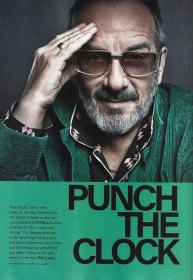 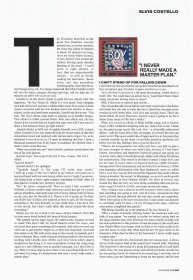
Page scans.
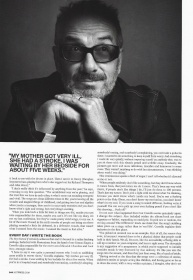 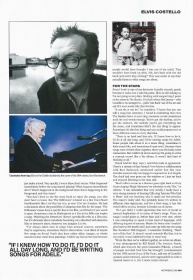
Page scans.
The Boy Named If
Elvis Costello & The Imposters
Pat Carty
|
The opening guitar chord is strangled then punctuated by the slam of stick against skin from the mighty hand of Pete Thomas. Costello howls "Farewell, OK" and we're off to the races. Remember him covering Little Richard's "Bama Lama Bama Loo" on odds and sods collection Kojak Variety? No, just me? Anyway, that same spirit is here. The Imposters play their arses off on a prime cut of R&B that rocks like a bastard.
Costello might deny it but there is a direct line from a lot of The Boy Named If going back through Brutal Youth and Blood & Chocolate to those first four mighty Attractions long players. Elvis can of course write a melodic beauty, like "Mr. Crescent" or "Paint The Red Rose Blue," with the best of them — McCartney and Bacharach don't have his phone number by mistake, and both men will surely curse themselves for not thinking of the title "What If I Can't Give You Anything But Love?" before, not to mind the killer tune — but marrying that with the clanging and banging is a different trick altogether. It's as if being forced off the road and having to record remotely due to circumstance has somehow steeled one of the best bands around. They knock the shite out of a uniformly great set of songs like a gang of young lads vying for attention.
The dancing joy of "Penelope Halfpenny," with that push behind the chorus, evokes the hard pop of The Beatles circa Revolver, Steve Nieve — the rock 'n' roll Rachmaninoff — stabs the organ while Thomas tries to tunnel through his snare during "Magnificent Hurt," a song with a middle eight stolen from the Gods when they weren't looking, and "Mistook Me For A Friend" could have fitted in on the Stax / Motownisms of Get Happy!!, driven home by Davey Faragher's bass Macca manoeuvres. The same man earns his paycheque for the bubbling bottom end he adds to "My Most Beautiful Mistake" on its own.
Lyrically, it's a set of stories from boyhood to man, further illustrated by Costello's daubings and short stories that fill out the package and, with close examination, the blanks. You can take that on board while you're tapping your toe if you please — someone gets stabbed, possibly, in "The Difference," the titular imaginary pal offers a hand to magic lantern land to escape childhood crises, the younger man gets his leg over — but I prefer to just grin like a loon as I'm air drumming and singing along. Costello's never really made any bad records, and he's been responsible for more than his share of brilliant ones; The Boy Named If is one of them. Put it on again.
|
|
Page scans.
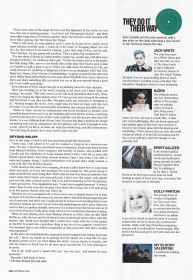
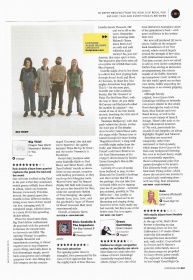
Cover and contents page.


|